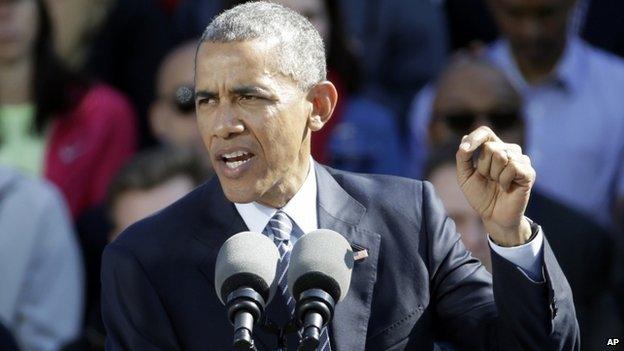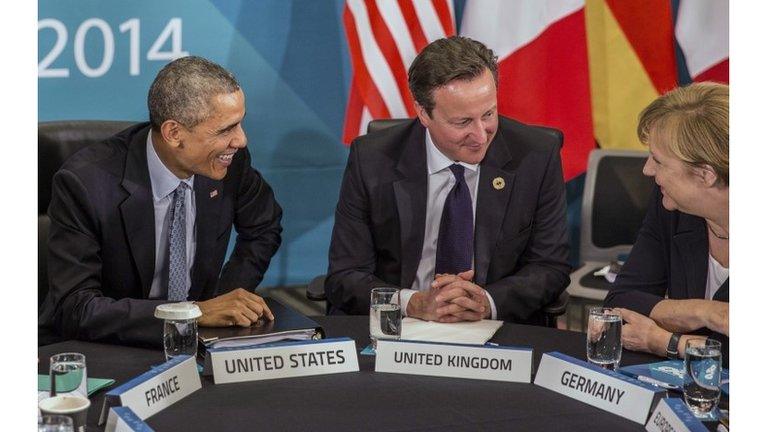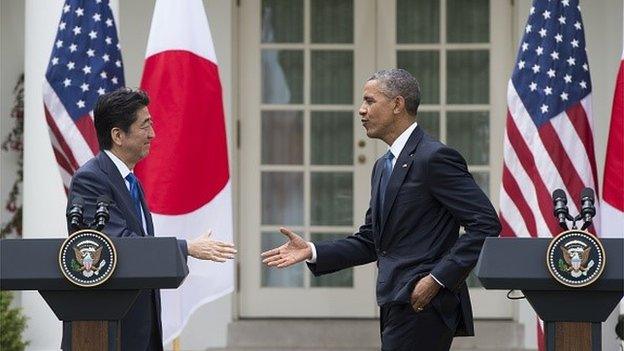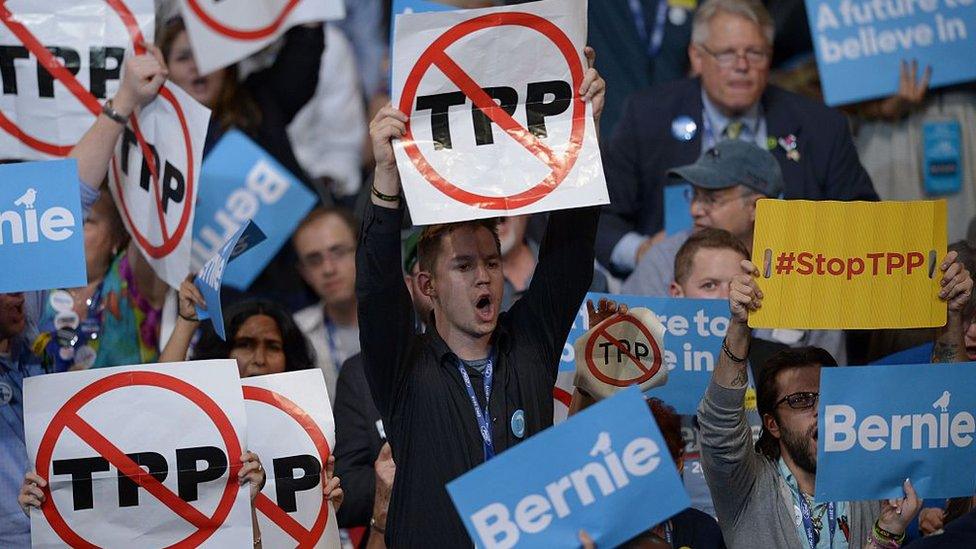TTIP: Why the EU-US trade deal matters
- Published

There has been plenty of opposition to TTIP
There's one big issue for the new UK government that stayed below the radar during the election campaign - trade negotiations between the European Union and the United States, known as TTIP, the Transatlantic Trade and Investment Partnership.
The big political parties didn't make much of it during the campaign. Both the Conservatives and Labour are broadly in favour, though the Greens are very critical. TTIP was however addressed in the manifestos. War on Want (who oppose the plans) have compiled the parties' positions on the issue., external
Outside the political arena there are some very strong opinions. Many business voices are enthusiastic, but there is also very vocal opposition.

What is TTIP and what is it for?
The Transatlantic Trade and Investment Partnership, or it will be if the negotiations are completed. The aim is to boost the economies of the EU and the US by removing or reducing barriers to trade and foreign investment.
President Obama said, when the talks were launched, that TTIP would promote "new growth and jobs on both sides of the Atlantic". Critics reject that claim - more of that below.

Barack Obama says TTIP will create jobs
A study by the Centre for Economic Policy Research (CEPR), external - done for the European Commission - estimated the potential gains for the EU as up to €119bn (£85bn; $134bn) a year and €95bn (£68bn; $107bn) for the US.
For a family of four that comes to €545 per year in the EU and €655 in the US. Wages would be higher, by 0.5% in the EU and just under 0.4% in the US.
The CEPR has done a more specific estimate of the benefits for the UK, external, which suggested gains in annual national income of up to £10bn.

How would TTIP work?
By eliminating almost all tariffs (taxes applied only to imported goods) on trade between the US and the EU.
But the tariffs imposed by the US and EU are already relatively low for the most part, although there are some exceptions in, for example, farm produce and textiles.
The bigger gains envisaged would come from reducing what are called non-tariff barriers. In particular the two sides think they can promote trade through what they call regulatory co-operation.
This is about costs to business. Complying with regulations involves a cost. A firm that wants to export may incur further costs meeting the regulatory requirements of the country it's selling into.
Mike Hawes of the SMMT tells Nigel Cassidy why you can't make a car in Europe, then sell it in the US
The European Commission says that rules in Europe and the US often achieve the same level of consumer safety and product quality, but differ in their technical details and their methods for ensuring that firms have met the rules.
One of the aims of TTIP is to reduce this burden on business. One option is recognising one another's standards. That's under consideration for many types of goods. They also plan to co-operate more closely on new regulation.
That basic idea is that by reducing the cost of exporting, TTIP would encourage more of it.

What about investment?
The idea here is to encourage transatlantic foreign investment. The European Commission says an agreement in this area would prohibit discrimination against foreign investors, expropriation, denying access to the courts and arbitrary and abusive treatment.
If a foreign investor felt these rules had been violated, they would have access to a system known as investor state dispute settlement, or ISDS. This is a system of tribunals that could award compensation to the investor if they had lost money as a result of a breach of the rules in the agreement.

Why is TTIP controversial?
Regulation
Much of the concern is about the regulatory aspect: that it would lead to lower standards of consumer and environmental protection and safety at work. A group of 170 European civil society organisations, external said in a statement that regulatory co-operation as envisaged in TTIP would result in "downward harmonisation".
There is also a concern that TTIP could undermine governments' right to regulate in the public interest. They say it will also give business groups a disproportionate influence over new regulation, and therefore, they argue, it is undemocratic.
Economic benefits
Others question the analysis behind claims that TTIP will be economically beneficial. Jeronim Capaldo, external of Tufts University in the US says the European Commission's study makes unrealistic assumptions about how easy it would be for workers who lose their jobs to find new employment. He argues that Europe would actually be worse off, in terms of economic activity, wages and government revenue.
Investment
There are also questions about whether a TTIP agreement would really stimulate more investment. A London School of Economics Study for the British Department of Business, Innovation, and Skills, external concluded that an investment chapter would be "highly unlikely to encourage investment above and beyond what would otherwise take place".
ISDS has generated a lot of heated opposition. One complaint is that it will discourage governments from regulating in the public interest. Olivier Hoedeman of Corporate Europe Observatory, a Brussels-based campaign group, said it would act as a "chill factor" on governments who would fear that business regulation might lead to protracted legal challenges and bills for compensation.

What impact could the trade deal have on the NHS?
ISDS arrangements are common in international investment agreements. But research by the United Nations Commission on Trade and Development, external suggests investors have made more use of the tribunal system in recent years.
Perhaps the most high-profile - some would say notorious - examples were the actions taken by the tobacco company Philip Morris against Uruguay, external and Australia, external over new rules on the packaging of their products, rules intended to make them less attractive to consumers. Neither case has been completed.
There is a particular concern expressed by British campaigners, external about the possible impact of ISDS on the National Health Service.
There is, they argue, a danger that if a government wants to reverse any arrangements to contract services out to private suppliers, it might risk being sued under ISDS. European and British officials insist that TTIP's ISDS provisions won't have that effect, but many campaigners don't believe it.

What is the timetable?
A summit of European leaders in December called for a comprehensive agreement by the end of 2015, external, though the European Trade Commissioner Cecilia Malmström has said that is probably unrealistic.
That will be challenging, given the technical complexity and the vigorous opposition. It would then have to be approved by the European Parliament and European Trade Ministers. The Ministers usually vote on trade by what is called qualified majority, external though unanimity might be required - that is both a legal question and a matter of political judgement.
Depending on the legal nature of the final agreement it might also need to be approved by all the EU member states, and Commissioner Malmström has said that is likely to be necessary. So there is plenty of scope for delays.
And it will need approval by the US Congress. President Obama is struggling unsuccessfully so far - to get Congress to give him what is called Trade Promotion Authority, external which would make US ratification less difficult.

What happened to the idea of global trade liberalisation and how would agreements such as TTIP fit?
There is a global trade negotiation under way in the World Trade Organization (WTO). It's known as the Doha Round, external, because that is where it was launched - back in 2001.
It has been very slow. At the end of 2013 the WTO members finally agreed a part of that agenda. It's called the Trade Facilitation Agreement, external and it's about the mechanics of international commerce - customs procedures, for example. The really hard stuff is still not agreed. Trade Facilitation is sometimes called the Doha Round's "low-hanging fruit", yet it still took 12 years to pick.
Frustration with the slow pace has led many countries to pursue bilateral and regional deals. The WTO's Director General Roberto Azevedo has said, external: "These initiatives are important for the multilateral (global) trading system — but they do not substitute it."
The other really big example is the Trans Pacific Partnership (TPP), external, which involves 11 countries, including the US and Japan (but not China). TPP is also still under negotiation.
- Published18 December 2014

- Published29 April 2015

- Published23 January 2017
